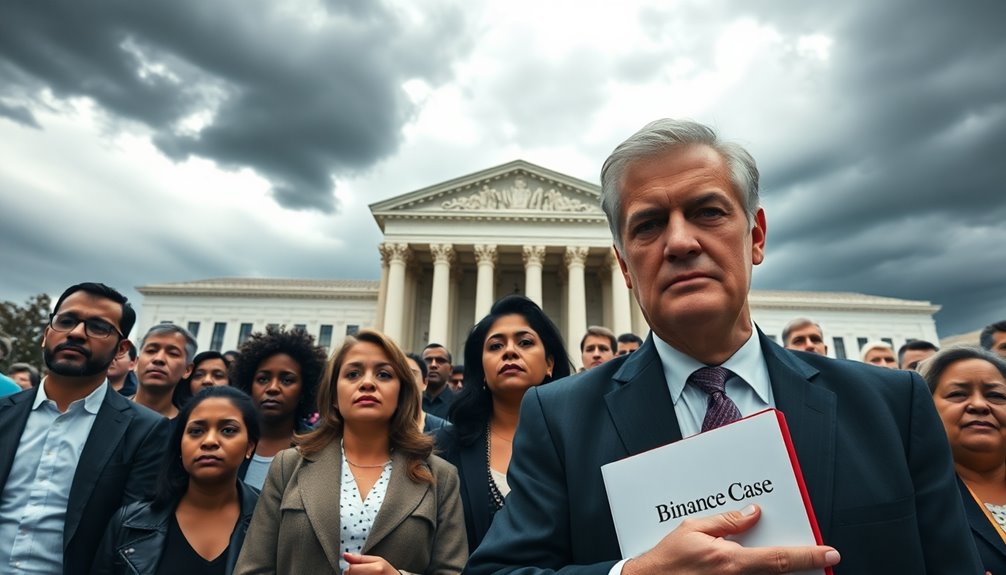Binance is facing a class action lawsuit following the U.S. Supreme Court's refusal to hear its appeal. This ruling allows allegations of serious legal violations, including RICO Act breaches and money laundering facilitation, to move forward. The class action was initiated by three investors in Seattle, claiming they lost millions due to Binance's lax policies on anonymous accounts. It's a significant setback for Binance amid ongoing regulatory scrutiny of the cryptocurrency market. As the case unfolds, it could mean serious implications for Binance's operations in the U.S. Stay tuned to discover the latest developments surrounding this evolving situation.
Key Takeaways
- The U.S. Supreme Court has denied Binance's appeal, allowing a class action lawsuit to proceed against the company.
- The lawsuit, initiated by Seattle investors, alleges violations of the RICO Act and money laundering facilitation.
- Binance previously settled with the U.S. Justice Department for over $4.3 billion, highlighting ongoing legal issues.
- The ruling indicates sufficient jurisdiction for U.S. securities laws despite Binance's overseas operations.
- The class action lawsuit raises concerns about potential damages and regulatory scrutiny impacting Binance's future operations.
Class Action Lawsuit Initiated

While the cryptocurrency landscape continues to evolve, a class action lawsuit has emerged against Binance, initiated by three investors in Seattle.
Filed in the U.S. District Court for the Western District of Washington in late August 2024, the lawsuit alleges serious violations of the Racketeer Influenced and Corrupt Organizations (RICO) Act.
Plaintiffs claim Binance enabled money laundering by allowing stolen cryptocurrencies to be deposited and transferred without proper tracking.
With accusations of lax policies, including the ability for criminals to open anonymous accounts, the lawsuit highlights ongoing exploitation despite previous settlements. Binance settled with the U.S. Justice Department for over $4.3 billion, showcasing the ongoing scrutiny the platform faces.
Investors Philip Martin and Yatin Khanna lost significant funds, with millions allegedly transferred to Binance.
The case raises critical questions about the platform's compliance and responsibility in preventing illegal activities.
Supreme Court Rejects Binance Appeal

After the U.S. Supreme Court denied Binance's petition for review, the way is clear for investors to proceed with their class action lawsuit.
Binance had argued it shouldn't be subject to U.S. securities laws, claiming its operations are based overseas, referencing the Morrison v National Australia Bank case to support its stance.
However, the 2nd U.S. Circuit Court of Appeals ruled that Binance's use of domestic servers and the finalization of transactions in the U.S. established sufficient jurisdiction. This ruling means Binance could face potential damages if investors succeed in their claims. The Supreme Court's decision adds to the legal challenges Binance faces, but it doesn't address other separate legal issues the company is grappling with. Furthermore, this dismissal reflects ongoing scrutiny of digital assets within legal frameworks, highlighting the complexities of cryptocurrency regulation.
Cryptocurrency Price Volatility

The legal challenges facing Binance are just one example of the broader uncertainties impacting the cryptocurrency market.
You'll notice that price volatility often stems from market sentiment and news. Positive updates can drive prices up, while negative reports lead to sharp declines. Herd mentality plays a significant role, where fear, uncertainty, and doubt trigger rapid sell-offs. Additionally, regulatory changes can cause sudden market shifts, further contributing to this volatility.
Supply and demand dynamics also come into play. Limited supply assets, like Bitcoin, experience price surges when demand spikes. Large trades by whales can manipulate trends, causing erratic price movements. Lastly, security concerns, including hacker attacks on exchanges, erode investor confidence, leading to immediate price drops and increased volatility. The Crypto Volatility Index (CVI) provides insights into how these factors affect market fluctuations for Bitcoin and Ether.
Corporate Blockchain Integration

As businesses increasingly recognize the potential of blockchain technology, integrating it into corporate operations offers transformative benefits.
You'll find that blockchain enhances data security through immutable records and decentralized storage, making it nearly impossible for hackers to access sensitive information. Additionally, the use of encrypted transactions ensures secure, transparent peer-to-peer payments, further protecting sensitive data.
With real-time monitoring, you can identify cybersecurity threats instantly.
Transparency improves as blockchain provides a clear, immutable ledger, reducing disputes and streamlining compliance processes.
By automating manual tasks with smart contracts, you'll cut operating costs and improve efficiency, enabling faster transactions.
Regulatory Scrutiny and Market Reactions

While regulatory scrutiny continues to mount, Binance faces significant challenges that directly impact its operations and market standing.
The SEC's allegations of securities law violations have put Binance.US in a precarious position, especially after the revival of a class action lawsuit. With the Supreme Court's denial of an appeal, you can expect the lawsuit to proceed, raising concerns about Binance's token sales.
Additionally, losing money transmitter licenses in several states and admitting to money laundering charges only compounds the issue. These setbacks have limited your access to USD transactions and affected customer service. As a response to these challenges, Binance.US initiated a crypto-only trading model to adapt to the ongoing regulatory pressures.
Despite these challenges, Binance.US strives to maintain operations and support a wide range of cryptocurrencies, yet it's clear that regulatory obstacles hinder its growth potential.
Market Adaptation Strategies Ahead

In light of ongoing regulatory challenges and market instability, companies in the crypto sector must adopt effective market adaptation strategies to remain competitive.
Start by streamlining your product offerings and focusing on profitable assets. Cut costs in non-essential areas while investing in innovation and research, as many firms are now prioritizing core products to enhance operational efficiency. Understanding the importance of digital asset management is crucial for maintaining competitiveness in this rapidly evolving market.
Continuous learning about blockchain developments and cryptocurrencies is vital; stay informed to navigate volatility.
Utilize algorithmic trading strategies to enhance efficiency and manage risks effectively. Implement dynamic pricing adjustments and maintain robust liquidity through automated inventory management.
Lastly, build a strong professional network within the crypto community to share insights and strategies.
Frequently Asked Questions
What Is Binance's Response to the Class Action Lawsuit?
Binance's response to the class action lawsuit revolves around asserting that the claims against it are meritless.
You'll see them argue that US securities laws don't apply because they're not based in the US, citing past Supreme Court decisions.
They deny selling unregistered tokens and emphasize that users faced risks when investing.
With a defensive stance, Binance vows to vigorously fight these allegations and maintain its position in the cryptocurrency market.
How Will This Affect Binance Users and Investors?
If you're navigating the wild west of cryptocurrency, you should brace for potential fallout from the ongoing class action lawsuit against Binance.
Legal consequences could lead to financial penalties or restitution, directly impacting your investments. Should the court side with investors, token values may drop, eroding market confidence.
Moreover, Binance might change operational practices, which could affect future token sales and compliance measures, ultimately altering your experience as a user or investor.
What Are Possible Outcomes of the Class Action Lawsuit?
The class action lawsuit could lead to several outcomes that directly impact you as a user.
You might see financial compensation if the plaintiffs recover stolen funds or secure a settlement.
There's also a chance Binance could face legal liability, leading to stricter security measures that affect how you interact with the platform.
Additionally, the case may set new standards in the industry, influencing how exchanges manage compliance and user security in the future.
Who Initiated the Class Action Lawsuit Against Binance?
Isn't it ironic that the very platform you might trust with your investments could end up facing a class action lawsuit?
In this case, it was a group of crypto investors who initiated the lawsuit against Binance back in 2020. They claimed Binance misled them about the risks associated with certain tokens, leading to significant financial losses. The investors argued that Binance failed to provide adequate information regarding the volatility and potential pitfalls of these tokens, which they believed contributed to their poor investment decisions. As the case unfolded, it drew attention not only to Binance’s practices but also to the broader implications for the cryptocurrency market, especially in light of the ongoing trump meme coin controversy explained. This situation sparked a comprehensive debate about investor protection in the rapidly evolving and often uncertain landscape of digital assets.
Their allegations centered around violations of securities laws and unregistered token sales.
Can Binance Appeal the Class Action Lawsuit Decision Later?
Yes, you can appeal the class action lawsuit decision later, but it depends on the legal arguments you present.
You might argue that U.S. securities laws shouldn't apply to you, citing cases like Morrison v. National Australia Bank.
If you believe the court misinterpreted jurisdiction, you could emphasize the global implications for financial markets.
However, keep in mind that each appeal carries risks and uncertainties about the outcome.
Conclusion
As the dust settles from the Supreme Court's decision, Binance finds itself at the center of a storm, with the class action lawsuit looming large. This isn't just a bump in the road; it's a wake-up call for the entire crypto industry. Like a ship navigating treacherous waters, companies must adapt or risk capsizing. The future of cryptocurrency hinges on how players respond to regulatory scrutiny and market volatility, shaping a new horizon for digital finance.









